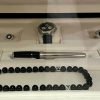SEOUL: North Korea fired a suspected intercontinental ballistic missile (ICBM) into the sea between the Korean peninsula and Japan on Thursday,
North Korea fired ballistic missile hours before South Korea’s president was due to fly to Tokyo for a summit expected to discuss ways to counter the nuclear-armed North.
North Korea has conducted multiple missile launches this week amid ongoing joint South Korea-US military drills that Pyongyang condemns as hostile actions.
The missile, fired at 7:10am (2210 GMT on Wednesday) from Pyongyang, flew about 1,000 kilometres at a lofted trajectory, South Korea’s Joint Chiefs of Staff said.
Japan’s defence ministry said the ICBM-type projectile appeared to have flown higher than 6,000 km for about 70 minutes.
It most likely landed outside Japan’s exclusive economic zones, 200 km west of Oshima-Oshima Island in Hokkaido, northern Japan, the ministry said.
Japan has not confirmed any information on damage from the missile, Japan’s Chief Cabinet Secretary Hirokazu Matsuno said, adding it had delivered a protest through North Korea’s embassy in Beijing.
“North Korea’s missile launch is a barbaric act that escalates its provocation to the entire international society,” Matsuno said. “We will confirm close cooperation with South Korea and the US towards North Korea’s complete denuclearisation at the Japan-South Korea summit today.”
South Korea convened a national security council meeting and “strongly condemned” the missile launch as a grave act of provocation threatening international peace.
South Korean President Yoon Suk Yeol ordered his country’s military to carry out drills with the United States as planned, saying North Korea would pay for its “reckless provocations,” according to his office.
South Korean and American forces began 11 days of joint drills, dubbed “Freedom Shield 23,” on Monday, held on a scale not seen since 2017 to counter the North’s growing threats.
Japanese Prime Minister Fumio Kishida said after the launch that regional peace and stability were the most important issue, and White House National Security Council spokesperson Adrienne Watson said the United States “strongly condemns” North Korea’s latest launch for needlessly raising tensions in the region.
US Indo-Pacific Command has assessed the missile did not pose an immediate threat to US personnel or territory, or to its allies.
The Hwasong-17 is the North’s biggest missile and is the largest road-mobile, liquid-fuelled ICBM in the world, capable of delivering a nuclear warhead anywhere in the United States.
Some analysts have speculated it could carry multiple warheads and decoys to better penetrate missile defences.
North Korea’s ballistic missile and nuclear weapons programmes are banned under UN Security Council resolutions, but Pyongyang says weapons development is necessary to counter “hostile policies” by Washington and its allies.
North Korea’s state news agency KCNA said on Sunday that North Korean leader Kim Jong Un led a ruling party meeting to discuss and decide on “important practical” war deterrence measures, saying “provocations of the US and South Korea are reaching the red-line.”



